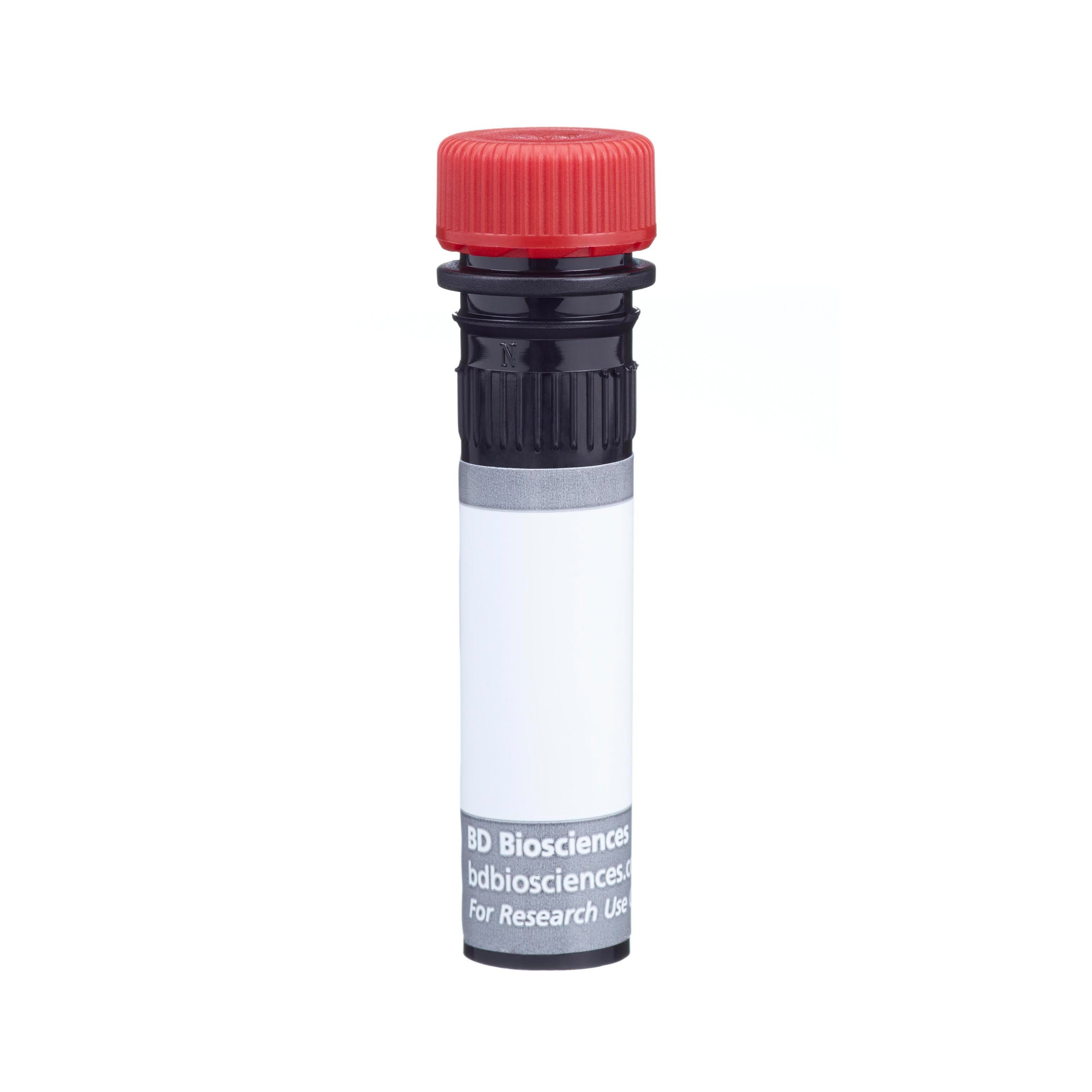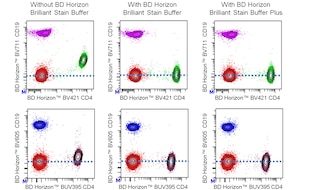-
Your selected country is
Middle East / Africa
- Change country/language
Old Browser
This page has been recently translated and is available in French now.
Looks like you're visiting us from {countryName}.
Would you like to stay on the current country site or be switched to your country?


Regulatory Status Legend
Any use of products other than the permitted use without the express written authorization of Becton, Dickinson and Company is strictly prohibited.
Preparation And Storage
Recommended Assay Procedures
BD™ CompBeads can be used as surrogates to assess fluorescence spillover (Compensation). When fluorochrome conjugated antibodies are bound to BD CompBeads, they have spectral properties very similar to cells. However, for some fluorochromes there can be small differences in spectral emissions compared to cells, resulting in spillover values that differ when compared to biological controls. It is strongly recommended that when using a reagent for the first time, users compare the spillover on cells and BD CompBead to ensure that BD CompBeads are appropriate for your specific cellular application.
For optimal and reproducible results, BD Horizon Brilliant Stain Buffer should be used anytime two or more BD Horizon Brilliant dyes are used in the same experiment. Fluorescent dye interactions may cause staining artifacts which may affect data interpretation. The BD Horizon Brilliant Stain Buffer was designed to minimize these interactions. More information can be found in the Technical Data Sheet of the BD Horizon Brilliant Stain Buffer (Cat. No. 563794/566349) or the BD Horizon Brilliant Stain Buffer Plus (Cat. No. 566385).
Note: When using high concentrations of antibody, background binding of this dye to erythroid cell subsets (mature erythrocytes and precursors) has been observed. For researchers studying these cell populations, or in cases where light scatter gating does not adequately exclude these cells from the analysis, this background may be an important factor to consider when selecting reagents for panel(s).
Product Notices
- The production process underwent stringent testing and validation to assure that it generates a high-quality conjugate with consistent performance and specific binding activity. However, verification testing has not been performed on all conjugate lots.
- Researchers should determine the optimal concentration of this reagent for their individual applications.
- An isotype control should be used at the same concentration as the antibody of interest.
- Caution: Sodium azide yields highly toxic hydrazoic acid under acidic conditions. Dilute azide compounds in running water before discarding to avoid accumulation of potentially explosive deposits in plumbing.
- For fluorochrome spectra and suitable instrument settings, please refer to our Multicolor Flow Cytometry web page at www.bdbiosciences.com/colors.
- Please refer to www.bdbiosciences.com/us/s/resources for technical protocols.
- BD Horizon Brilliant Stain Buffer is covered by one or more of the following US patents: 8,110,673; 8,158,444; 8,575,303; 8,354,239.
- Please refer to http://regdocs.bd.com to access safety data sheets (SDS).
- BD Horizon Brilliant Ultraviolet 805 is covered by one or more of the following US patents: 8,110,673, 8,158,444; 8,227,187; 8,575,303; 8,354,239.
Companion Products






The M5 monoclonal antibody specifically binds to human CD126 which is also known as the alpha subunit of the human IL-6 Receptor (IL-6Rα). CD126 is an 80 kDa type I transmembrane glycoprotein, also known as gp80 and B cell stimulatory factor-2 (BSF-2) Receptor. The IL-6Rα subunit associates with the 130-160 kDa gp130 subunit (IL-6 Receptor β chain, CD130), that is shared with the receptor complexes for Leukemia Inhibitory Factor (LIF), Ciliary Neurotropic Factor (CNTF), Oncostatin M (OSM), IL-11, Cardiotropin 1 (CT-1) and possibly Neurotrophin-1/B Cell-Stimulating Factor 3 (NNT-1/BSF-3). The IL-6Rα chain binds IL-6 with low affinity; however the association with CD130 stabilizes the IL-6/IL-6Rα complex resulting in the formation of a high affinity ligand-receptor complex. The IL-6Rβ chain mediates signal transduction. CD126 is expressed at high levels by activated and EBV-transformed B cells, plasma cells and myeloma cells and at lower levels by most leucocytes, epithelial cells, fibroblasts, hepatocytes and neural cells. IL-6Rα exists in soluble form in human serum. The serum levels of soluble IL-6Rα appear to elevate in pathological situations such as multiple myeloma, Grave's disease, juvenile chronic arthritis and HIV. The M5 antibody is directed against an epitope not involved in interactions of CD126 with IL-6 or CD130.
The antibody was conjugated to BD Horizon™ BUV805 which is part of the BD Horizon Brilliant™ Ultraviolet family of dyes. This dye is a tandem fluorochrome of BD Horizon BUV395 with an Ex Max of 348 nm and an acceptor dye with an Em Max at 805 nm. BD Horizon Brilliant BUV805 can be excited by the ultraviolet laser (355 nm) and detected with a 820/60 filter and a 770LP.

Development References (7)
-
Autissier P, Liautard J, Brochier J, Gaillard JP. Activation of the gp130 signaling pathway by monoclonal antibodies directed against the gp130 molecule. Eur J Immunol. 1997; 27(3):794-797. (Biology). View Reference
-
Brochier J, Liautard J, Jacquet C, Gaillard JP, Klein B. Optimizing therapeutic strategies to inhibit circulating soluble target molecules with monoclonal antibodies: example of the soluble IL-6 receptors. Eur J Immunol. 2001; 31(1):259-264. (Immunogen: ELISA, Immunoprecipitation, In vivo exacerbation). View Reference
-
Gaillard JP, Liautard J, Duperray C, Brochier J. mAb against human gp80 IL-6 receptor. In: Schlossman SF. Stuart F. Schlossman .. et al., ed. Leucocyte typing V : white cell differentiation antigens : proceedings of the fifth international workshop and conference held in Boston, USA, 3-7 November, 1993. Oxford: Oxford University Press; 1995:1891-1894.
-
Gaillard JP, Mani JC, Liautard J, Klein B, Brochier J. Interleukin-6 receptor signaling. I. gp80 and gp130 receptor interaction in the absence of interleukin-6.. Eur Cytokine Netw. 1999; 10(1):43-8. (Clone-specific: ELISA, Functional assay). View Reference
-
Liautard J, Gaillard JP, Mani JC, et al. Epitope analysis of human IL-6 receptor gp80 molecule with monoclonal antibodies.. Eur Cytokine Netw. 1994 May-June; 5(3):293-300. (Biology). View Reference
-
Tupitsyn N, Kadagidze Z, Gaillard JP, et al. Functional interaction of the gp80 and gp130 IL-6 receptors in human B cell malignancies. Clin Lab Haematol. 1998; 20(6):345-352. (Clone-specific: Flow cytometry). View Reference
-
Van Snick J. Interleukin-6: an overview. Annu Rev Immunol. 1990; 8:253-278. (Biology). View Reference
Please refer to Support Documents for Quality Certificates
Global - Refer to manufacturer's instructions for use and related User Manuals and Technical data sheets before using this products as described
Comparisons, where applicable, are made against older BD Technology, manual methods or are general performance claims. Comparisons are not made against non-BD technologies, unless otherwise noted.
For Research Use Only. Not for use in diagnostic or therapeutic procedures.
Report a Site Issue
This form is intended to help us improve our website experience. For other support, please visit our Contact Us page.